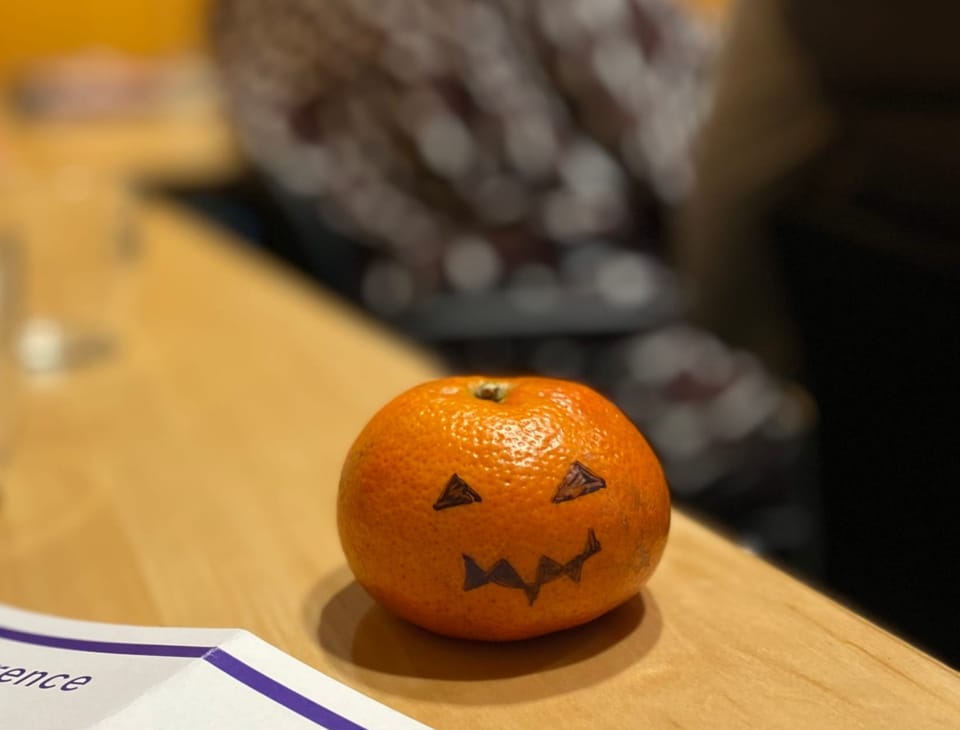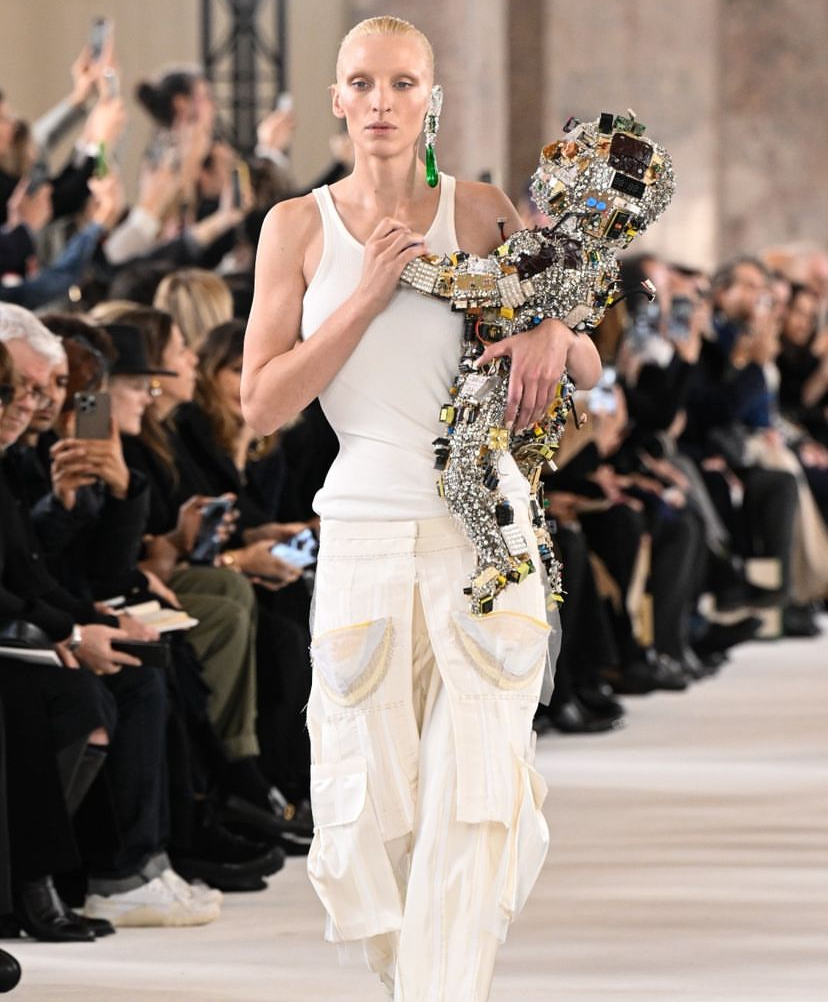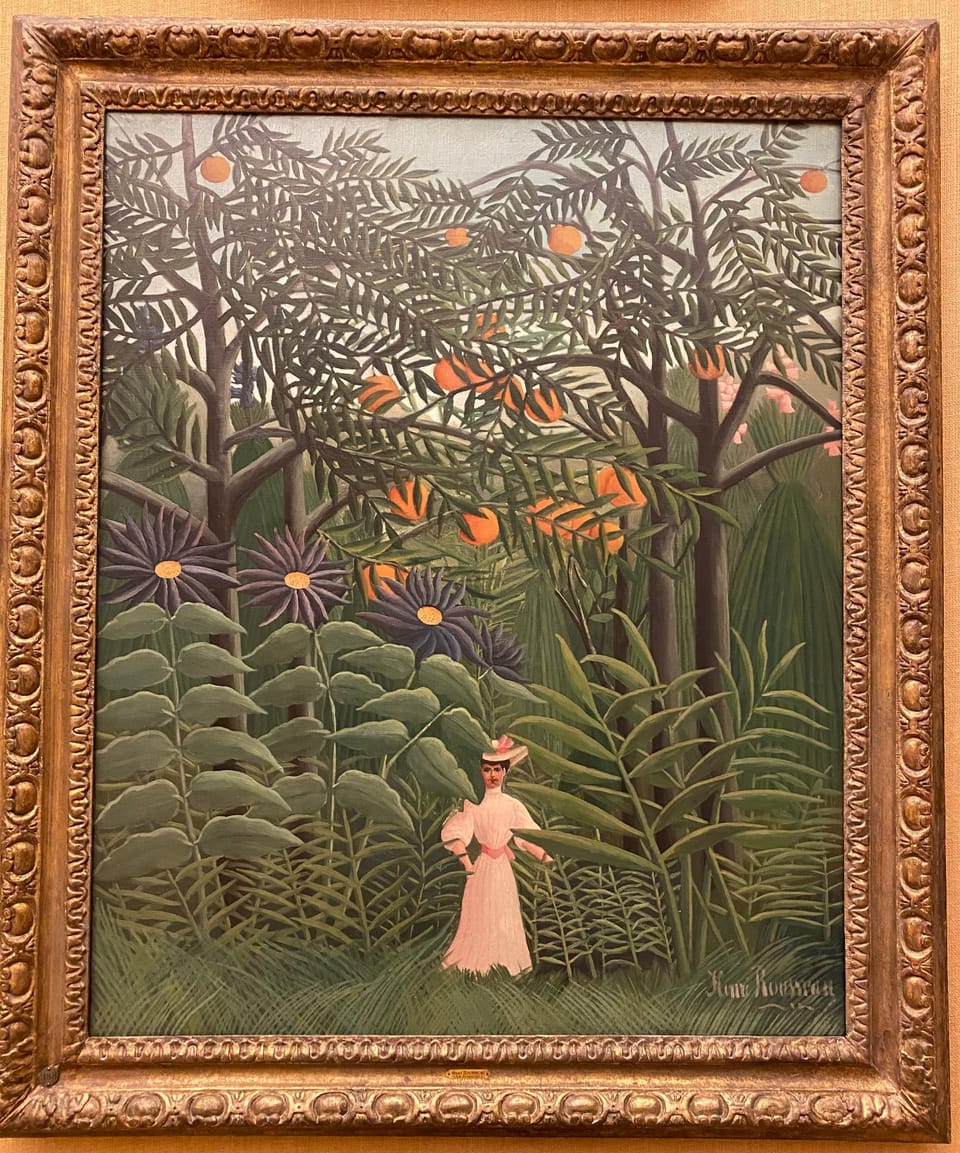'Holy Grail'/'Massive Difference'
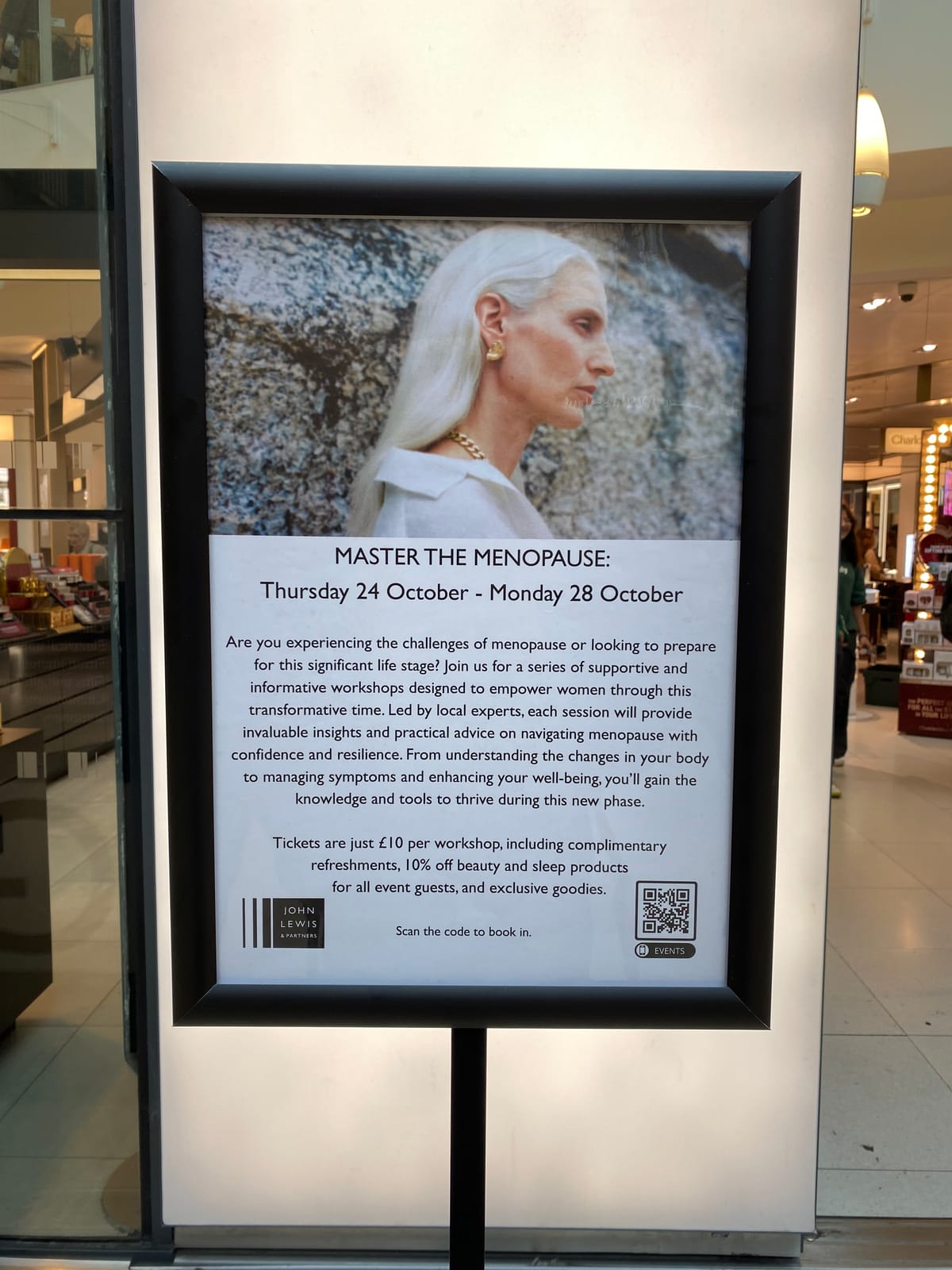
For the past six months I have been collecting screenshots of advertisements I see on Instagram. Specifically, I have been tracking ads I am shown ever since I started looking up, learning about, and writing about menopause. There are three distinct themes in the advertisements: managing weight gain associated with hormonal changes during peri/menopause, particularly 'hormone belly'; managing the wrinkling and aging of skin; the use of natural elements in supplements to -yes, manage - the symptoms of peri/menopause. Let’s take each one in turn.
Group 1: Hormones and weight
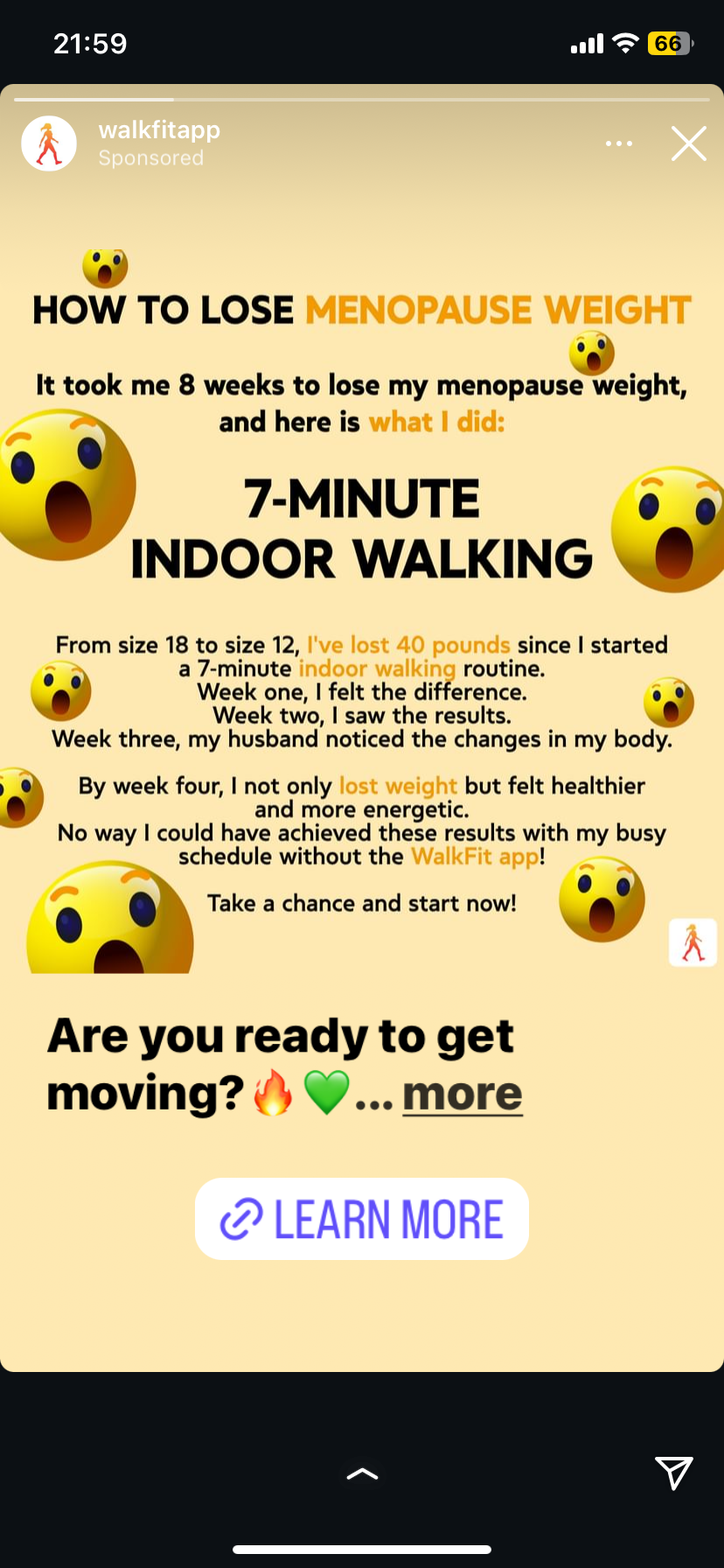
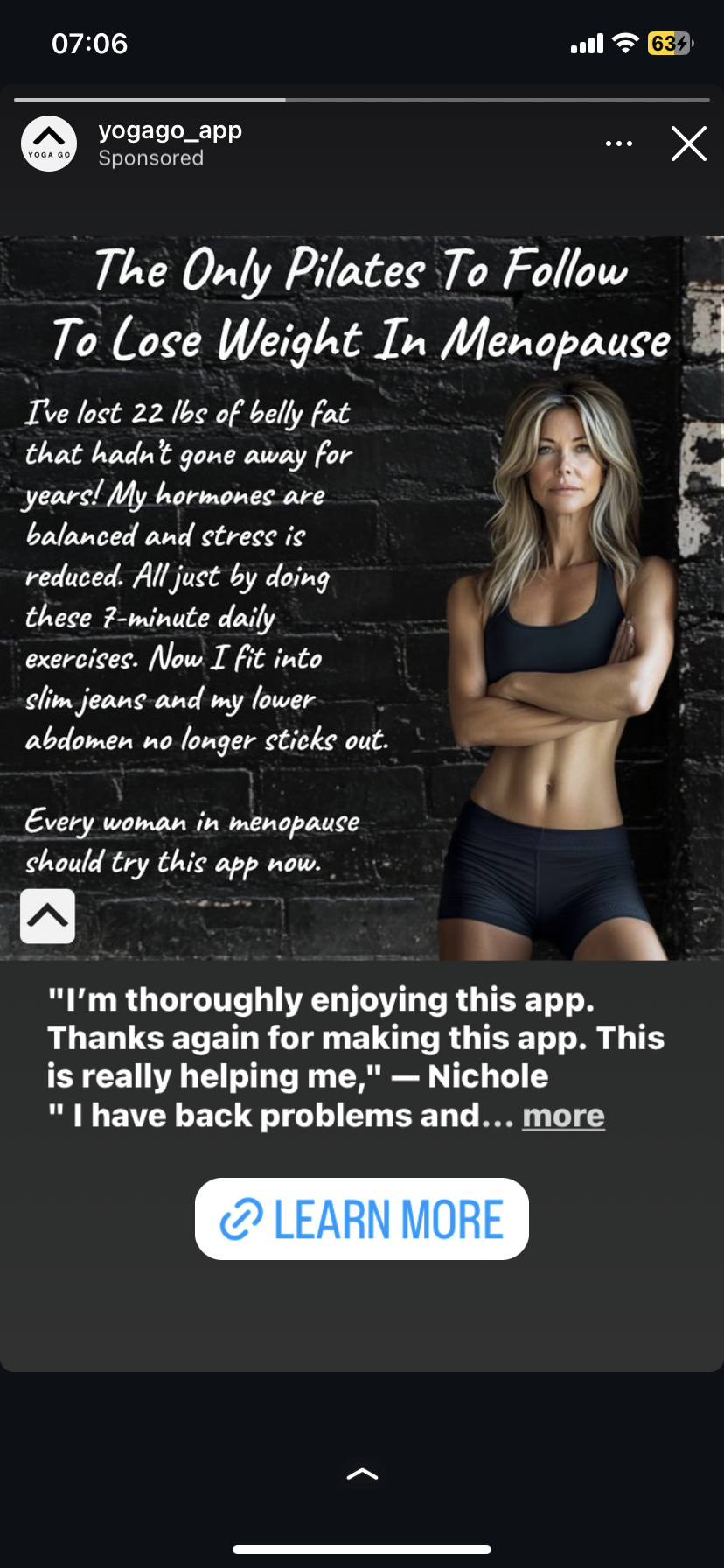
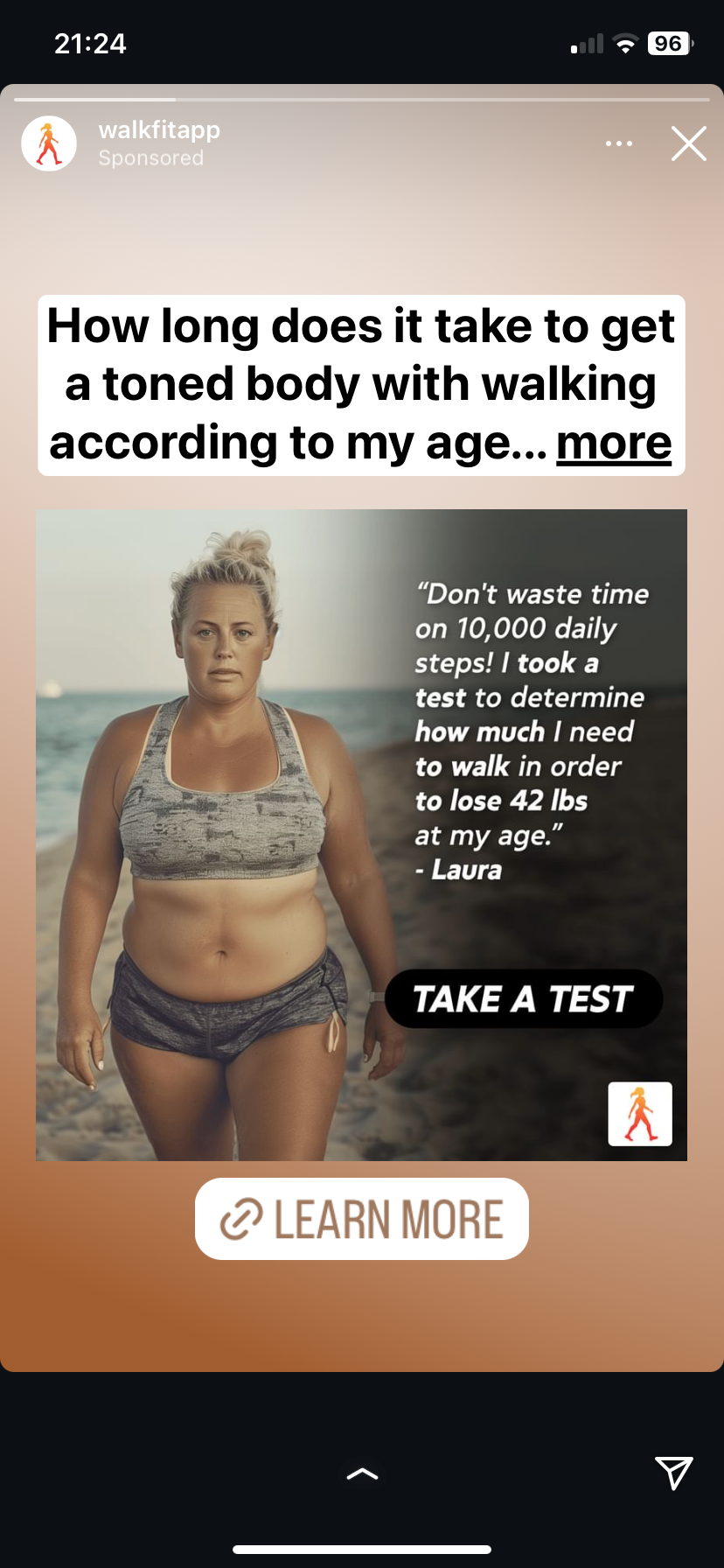
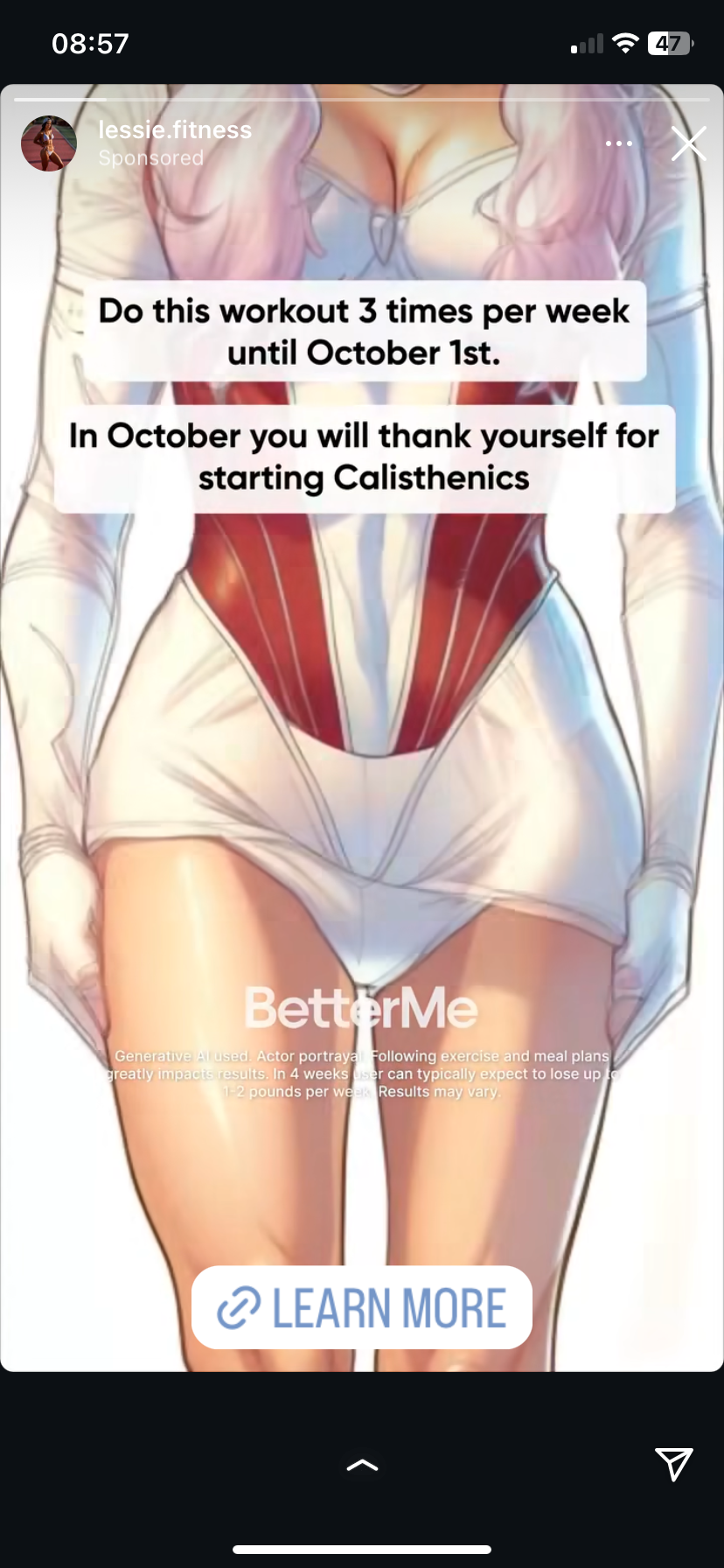
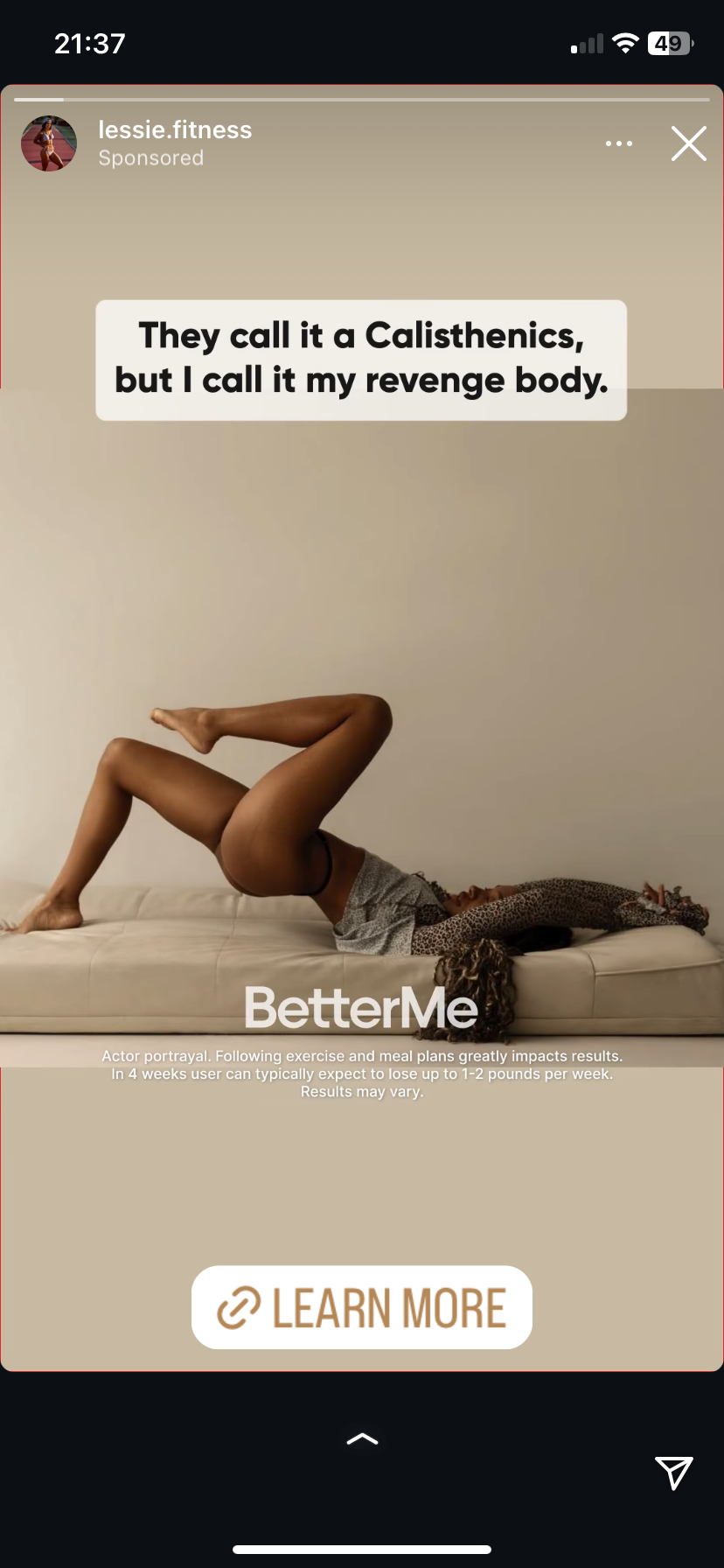
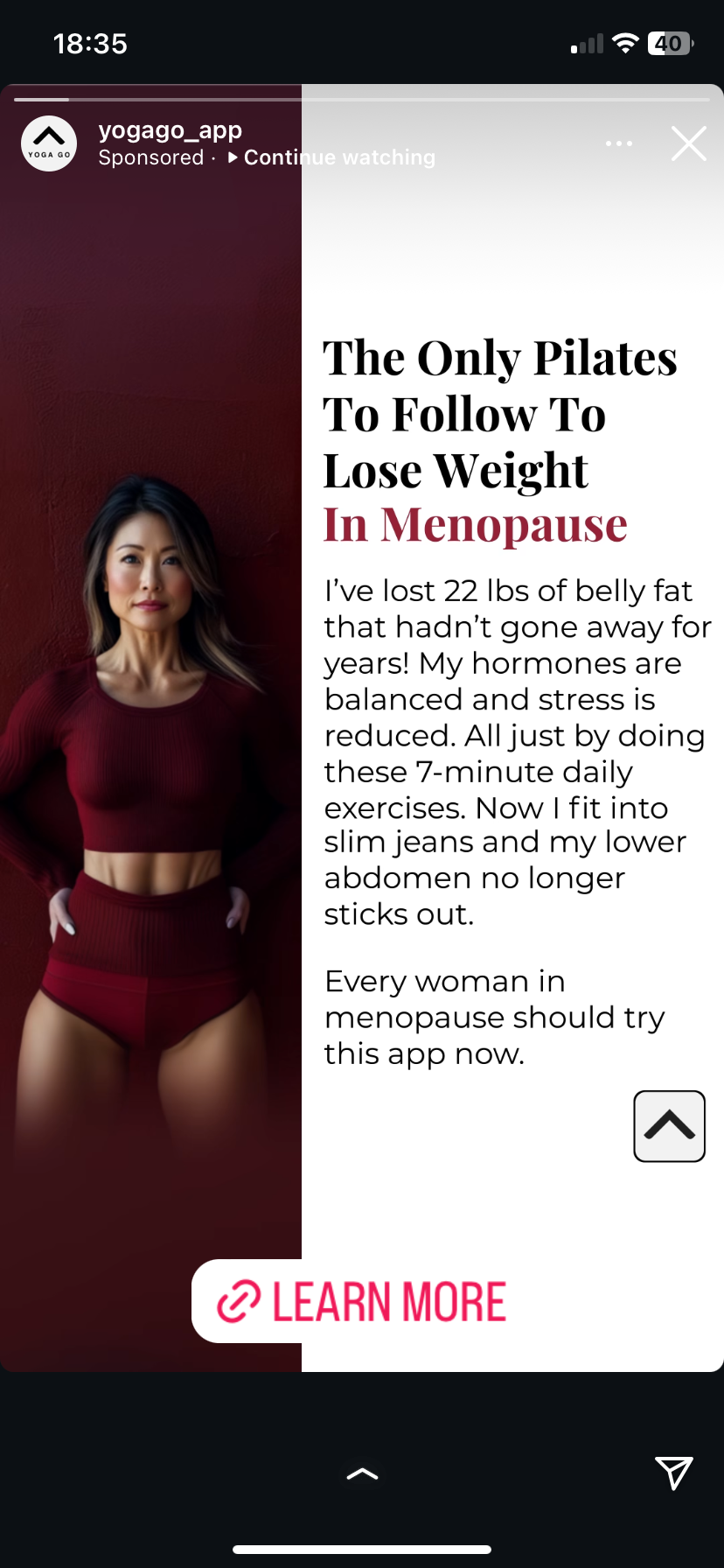
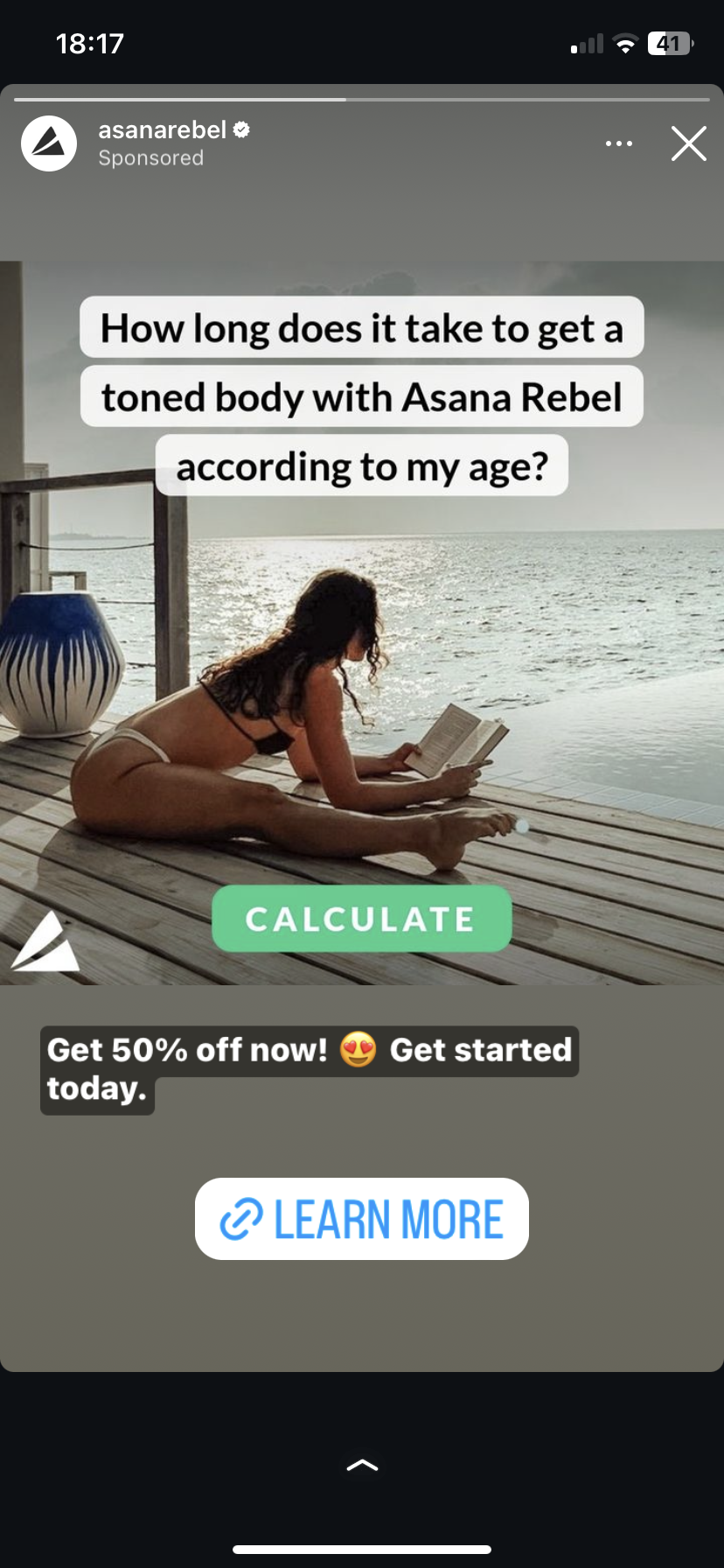

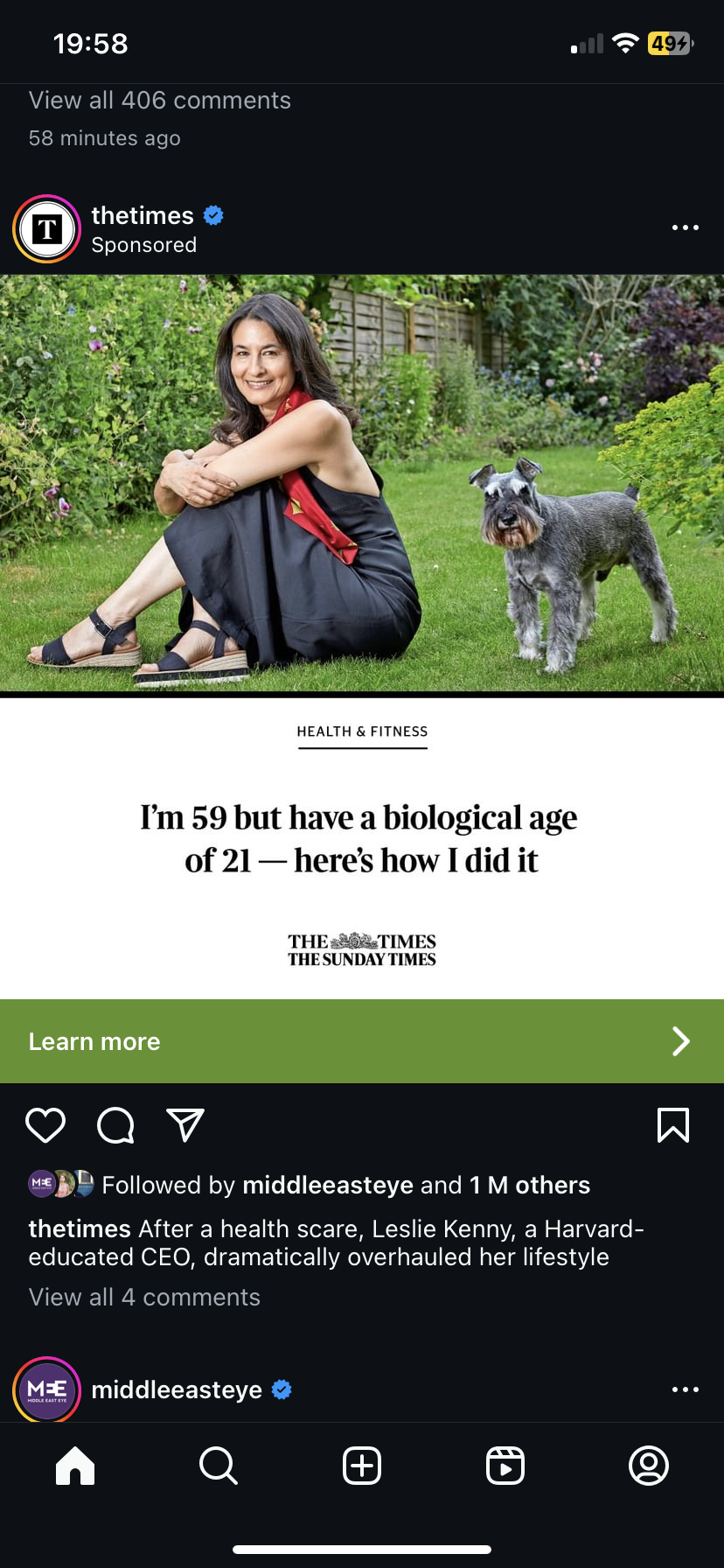
Instagram advertisements July - October 2024
Group 2: Skincare
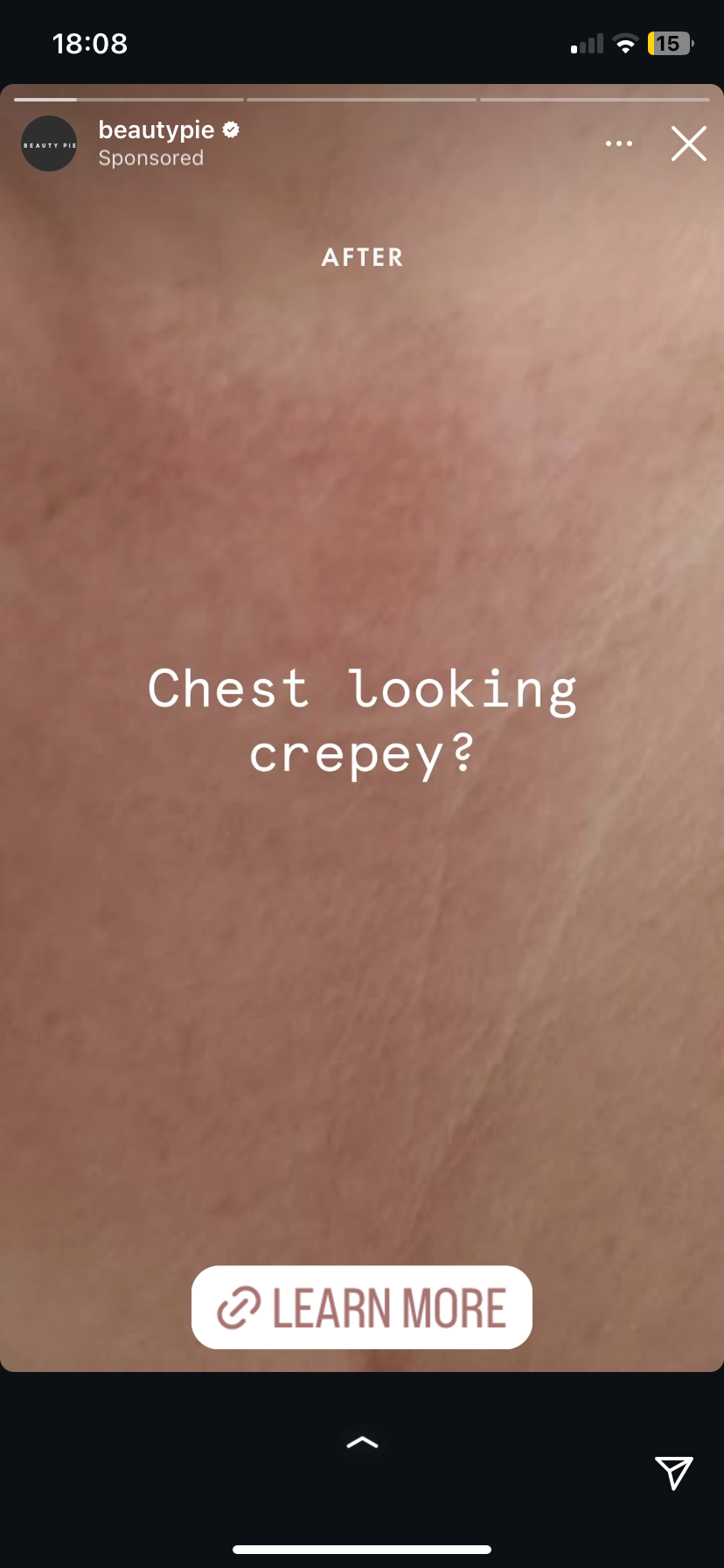
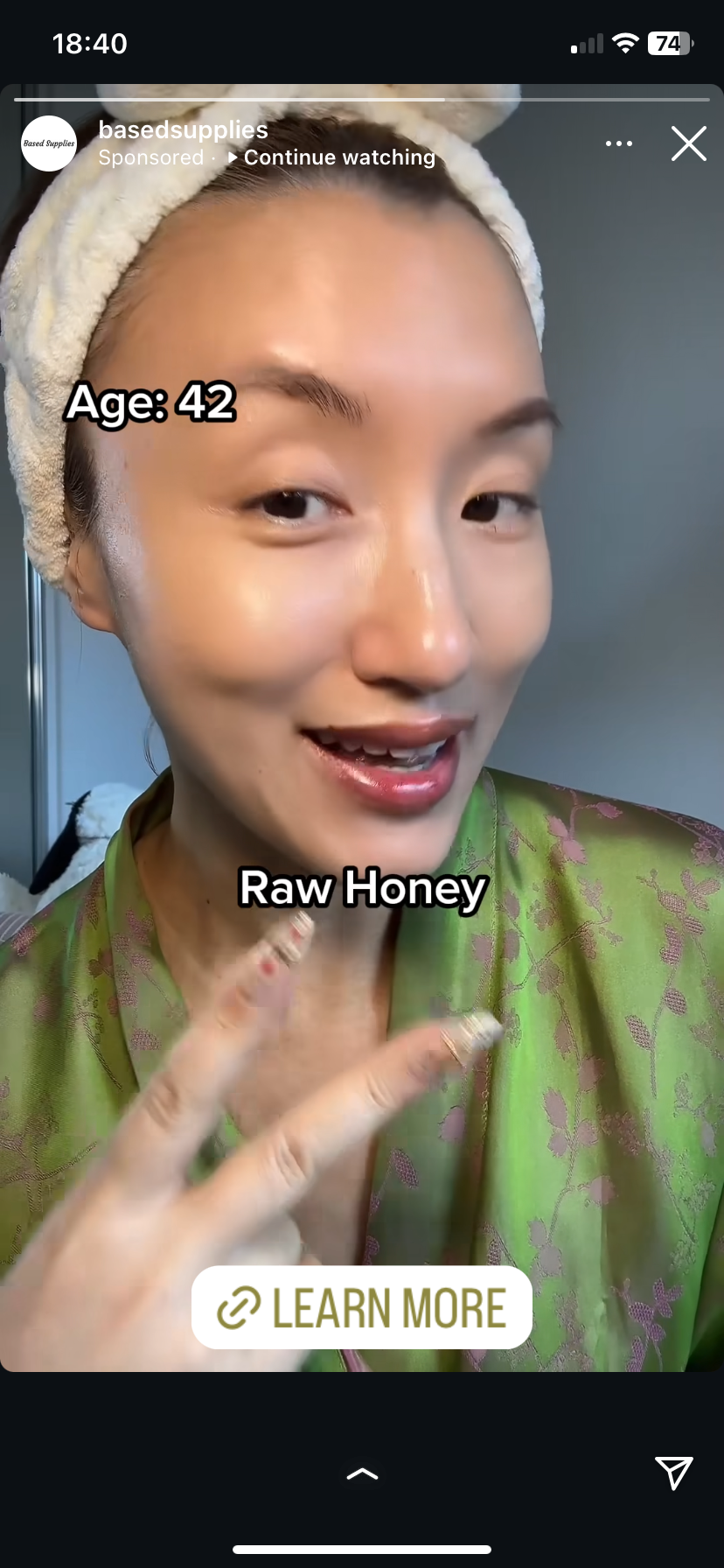
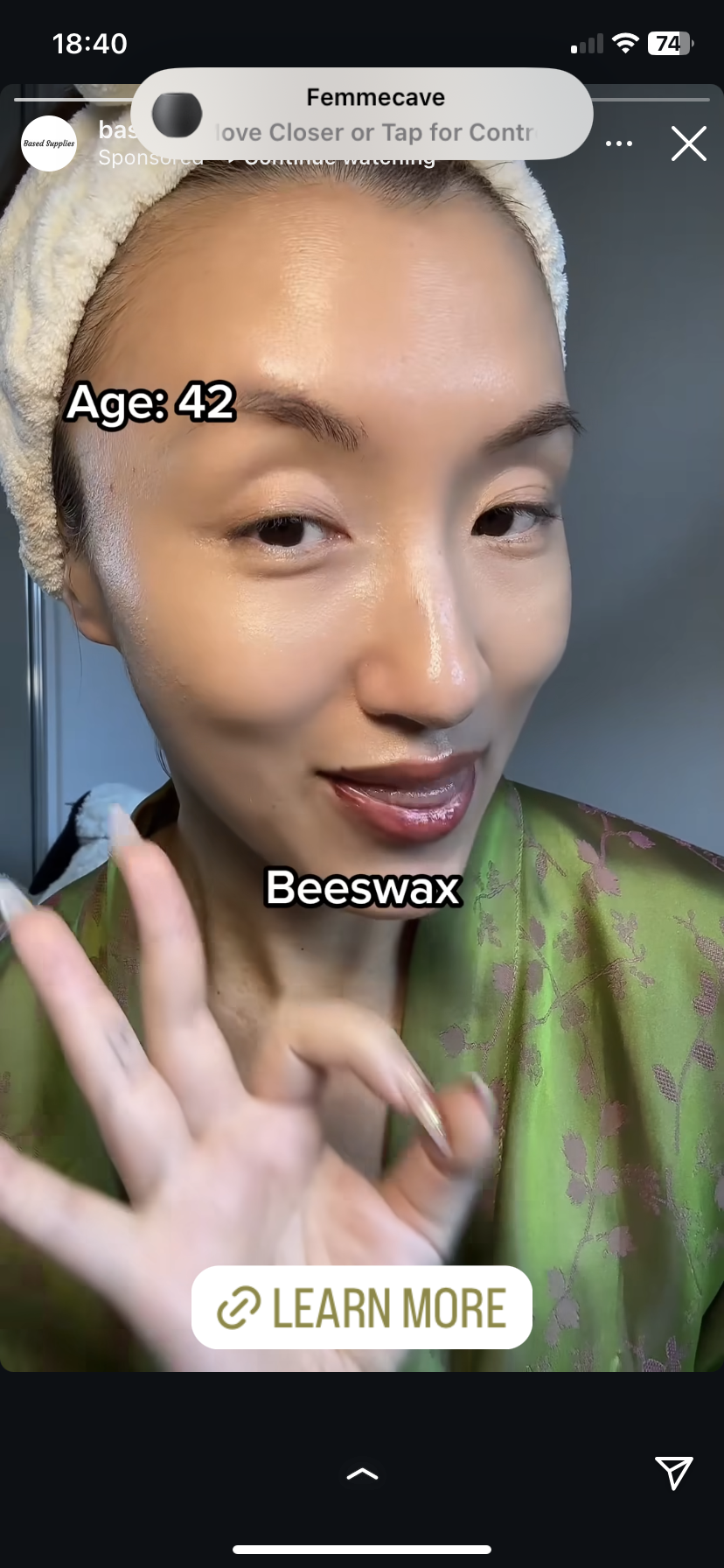
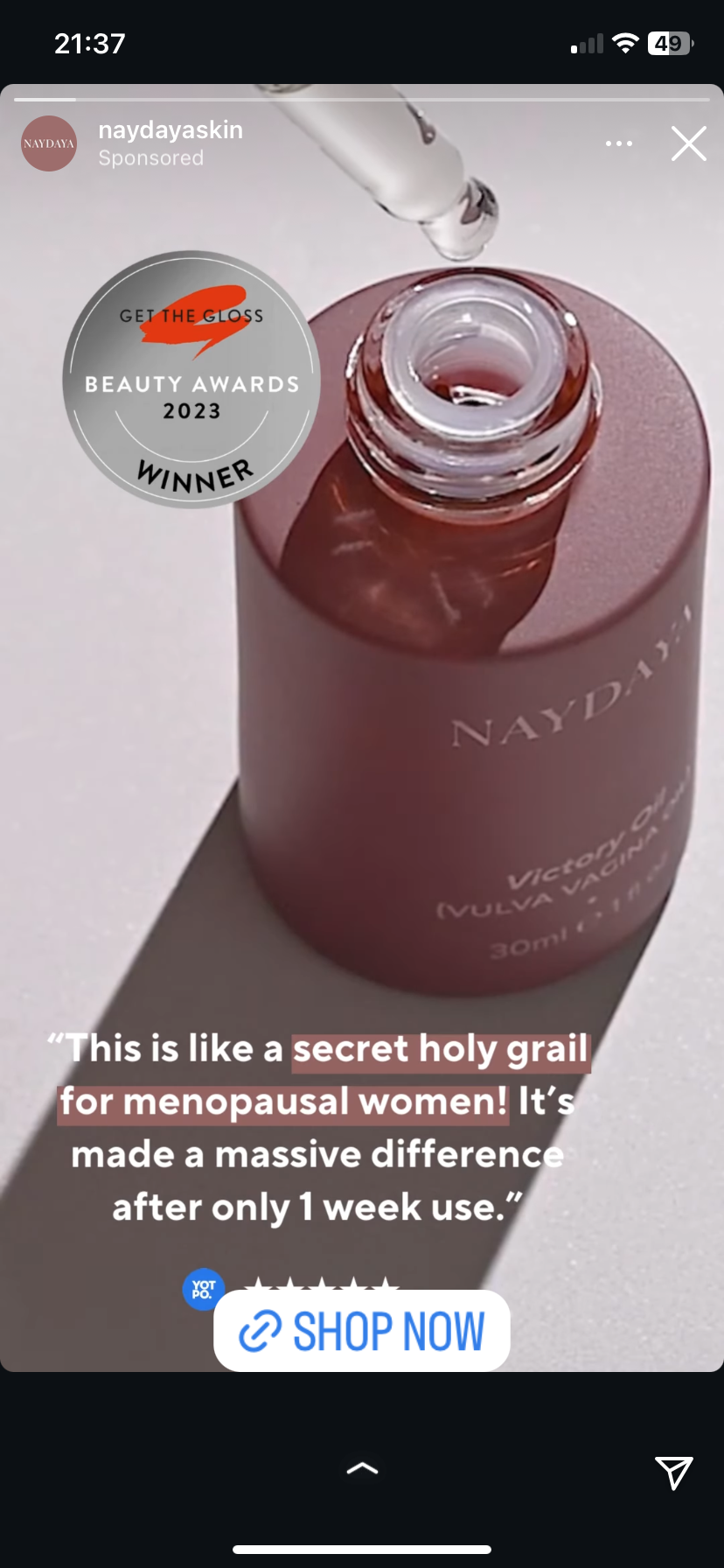
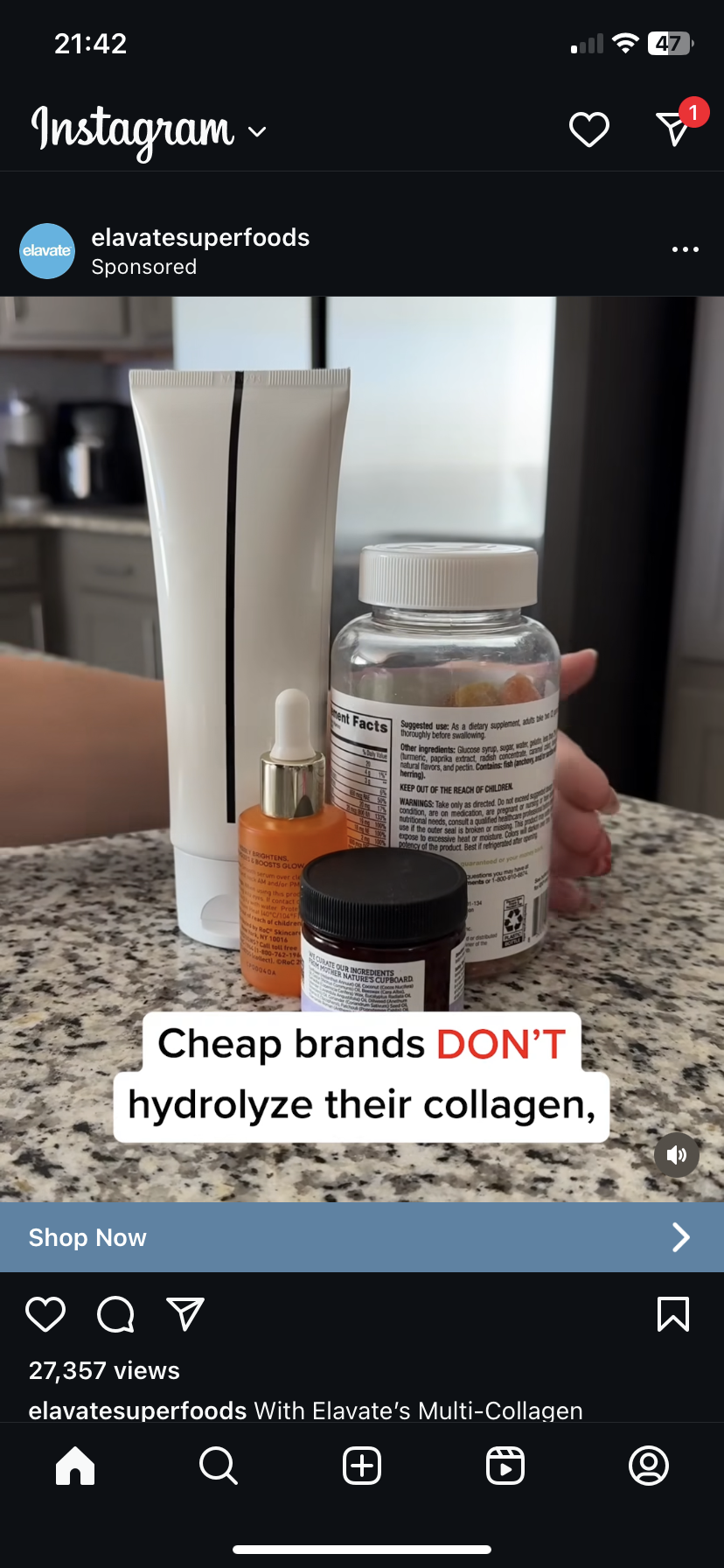
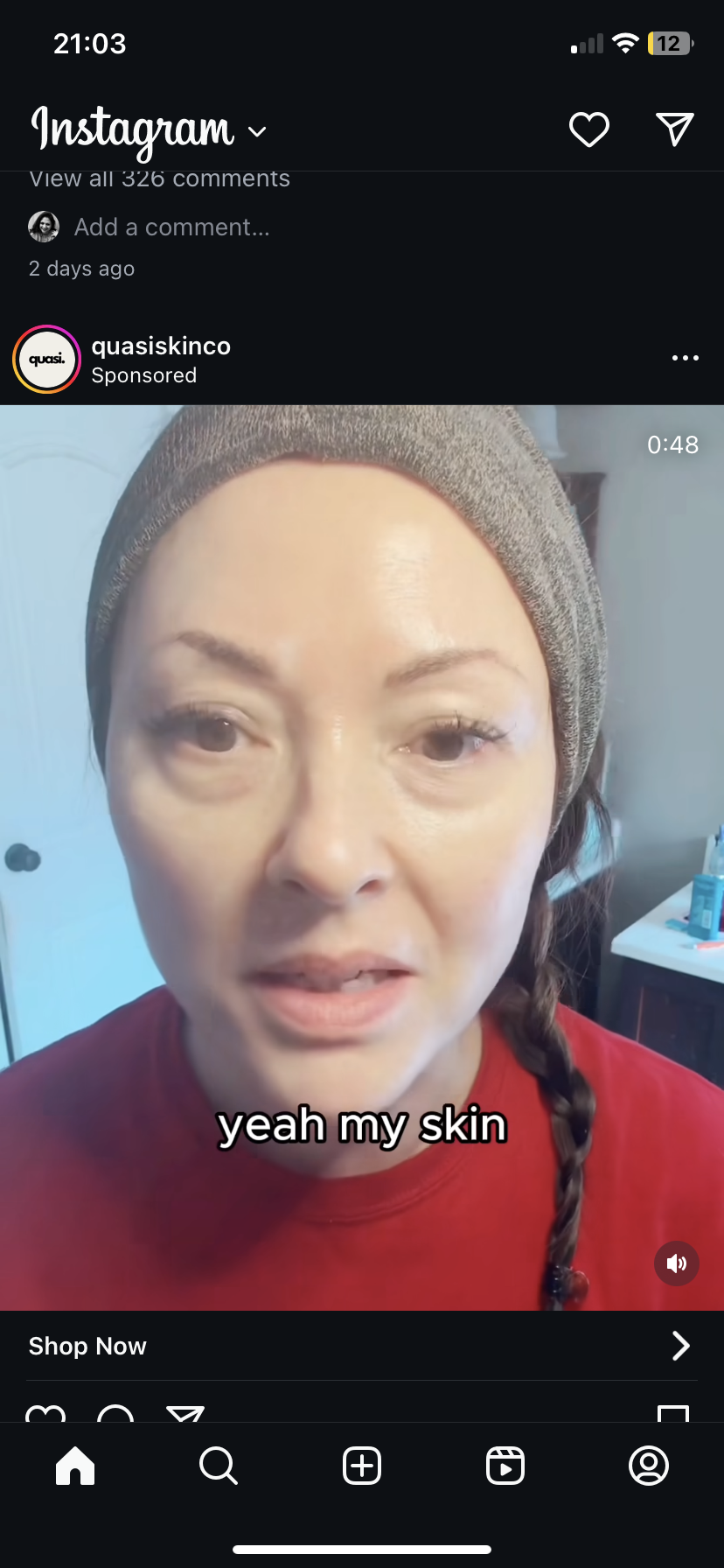
Instagram advertisements July - October 2024
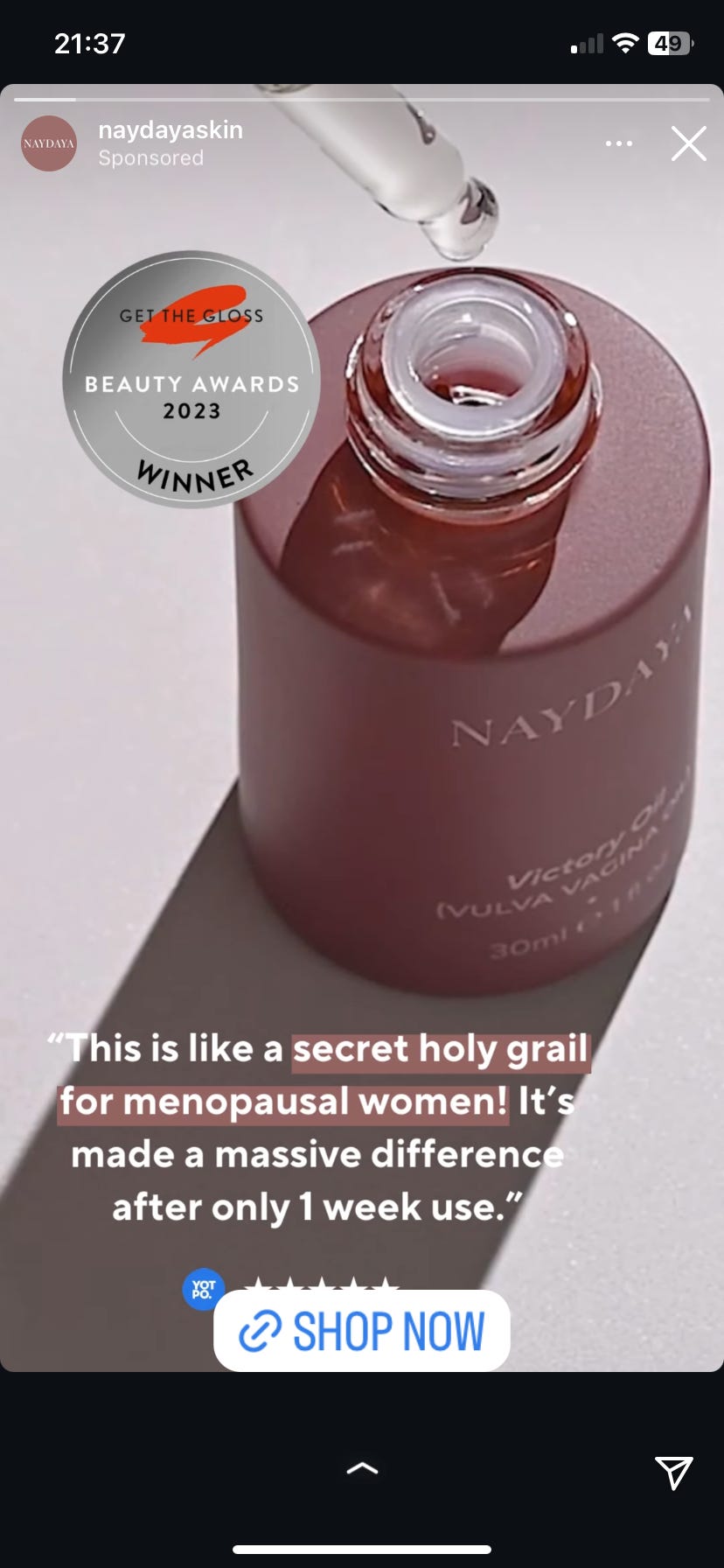
(Please note that the one above is called ‘Victory Oil’ for the vulva and vagina…)
Group 3: Supplements
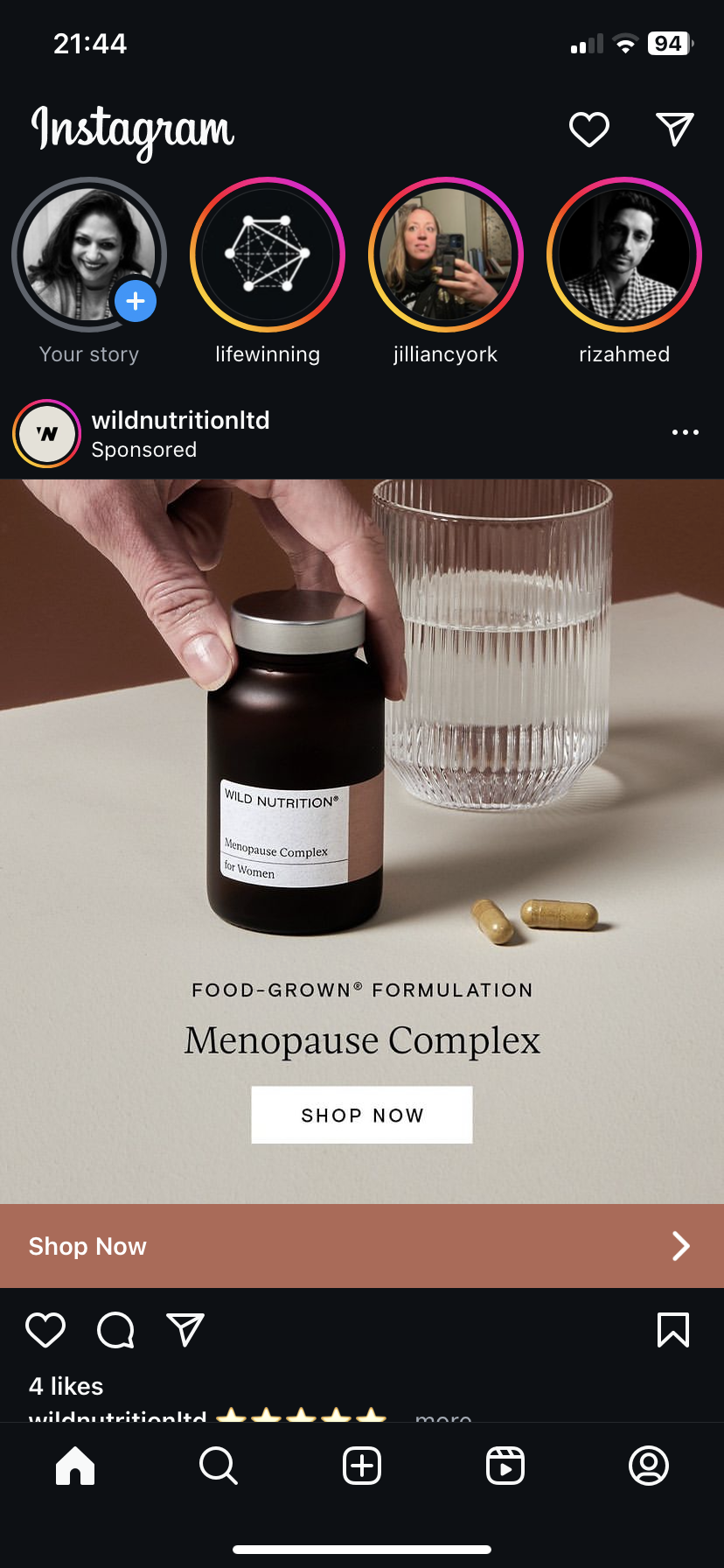
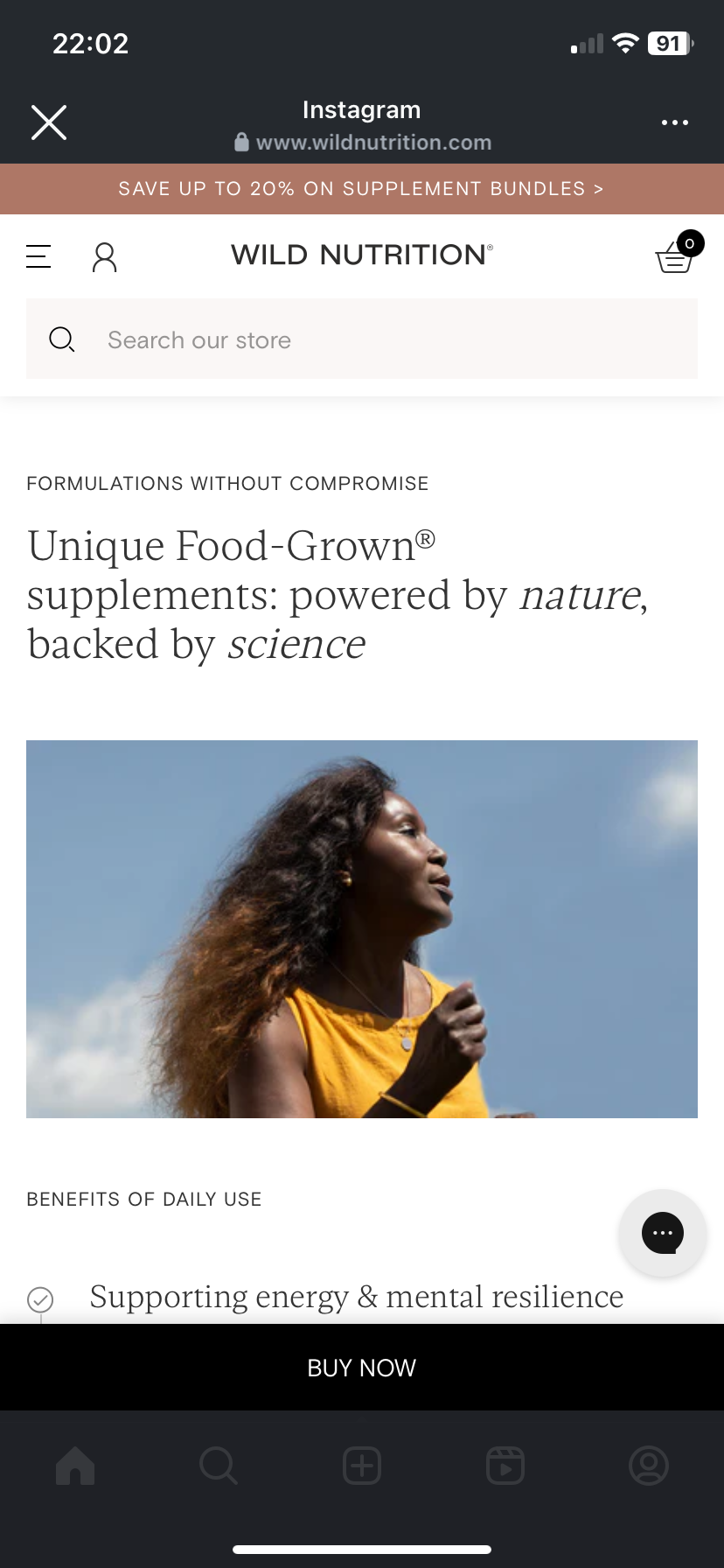
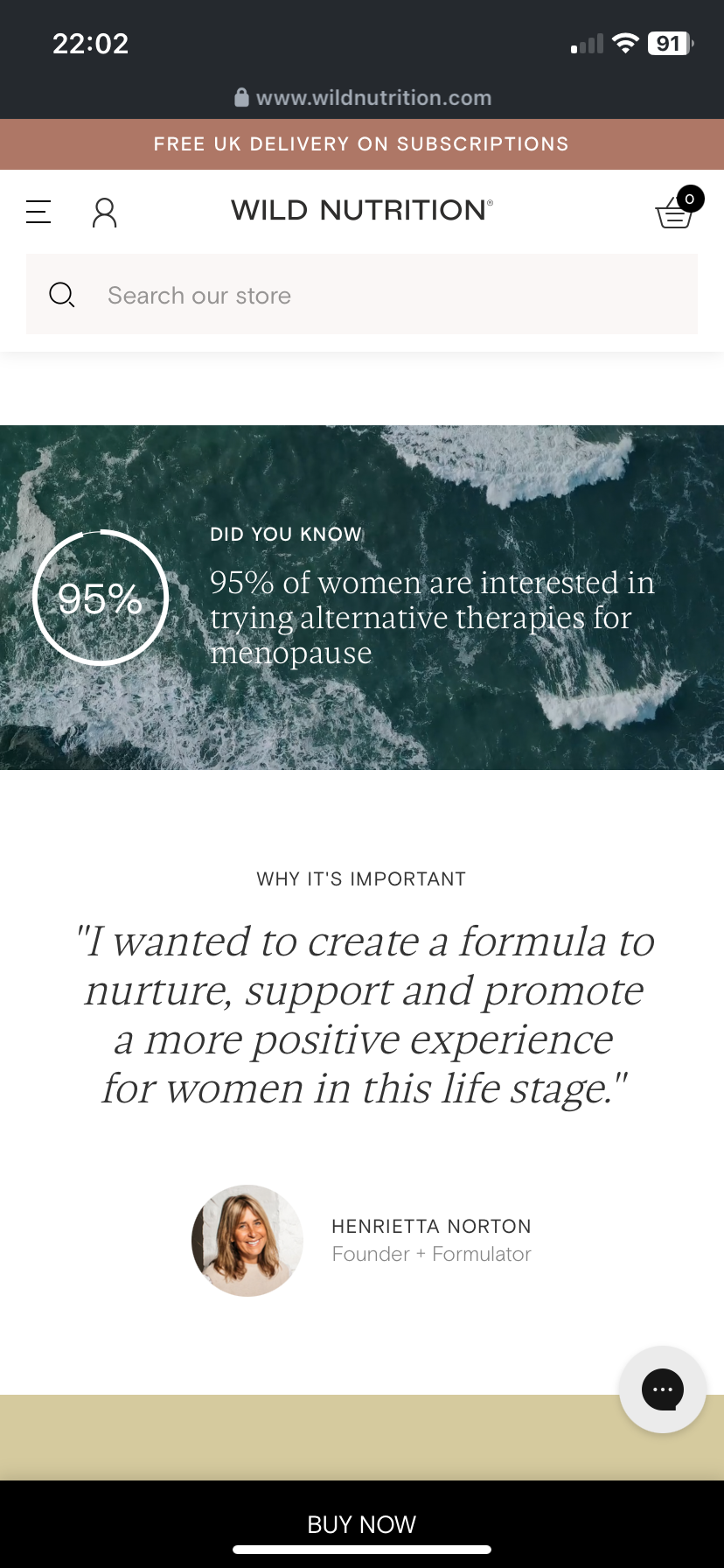
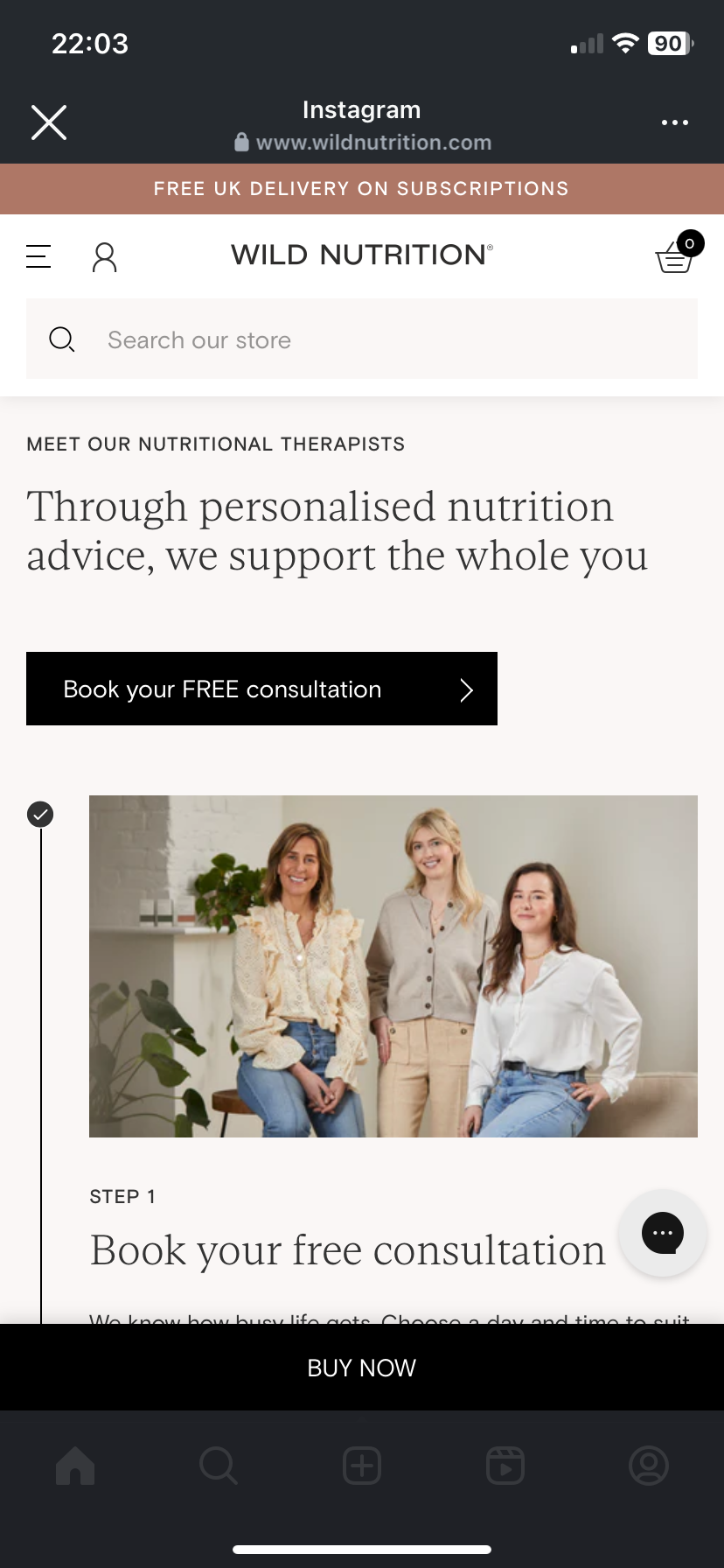
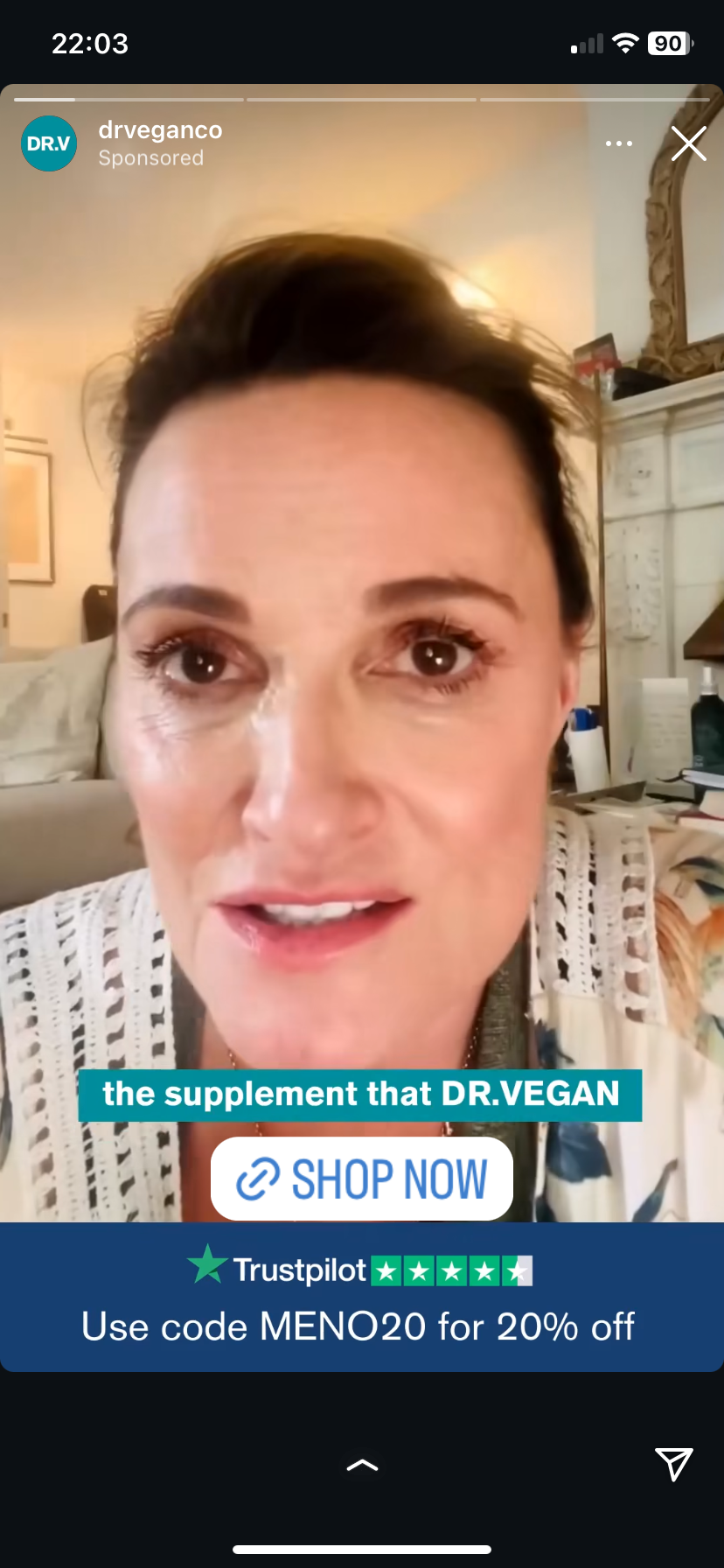

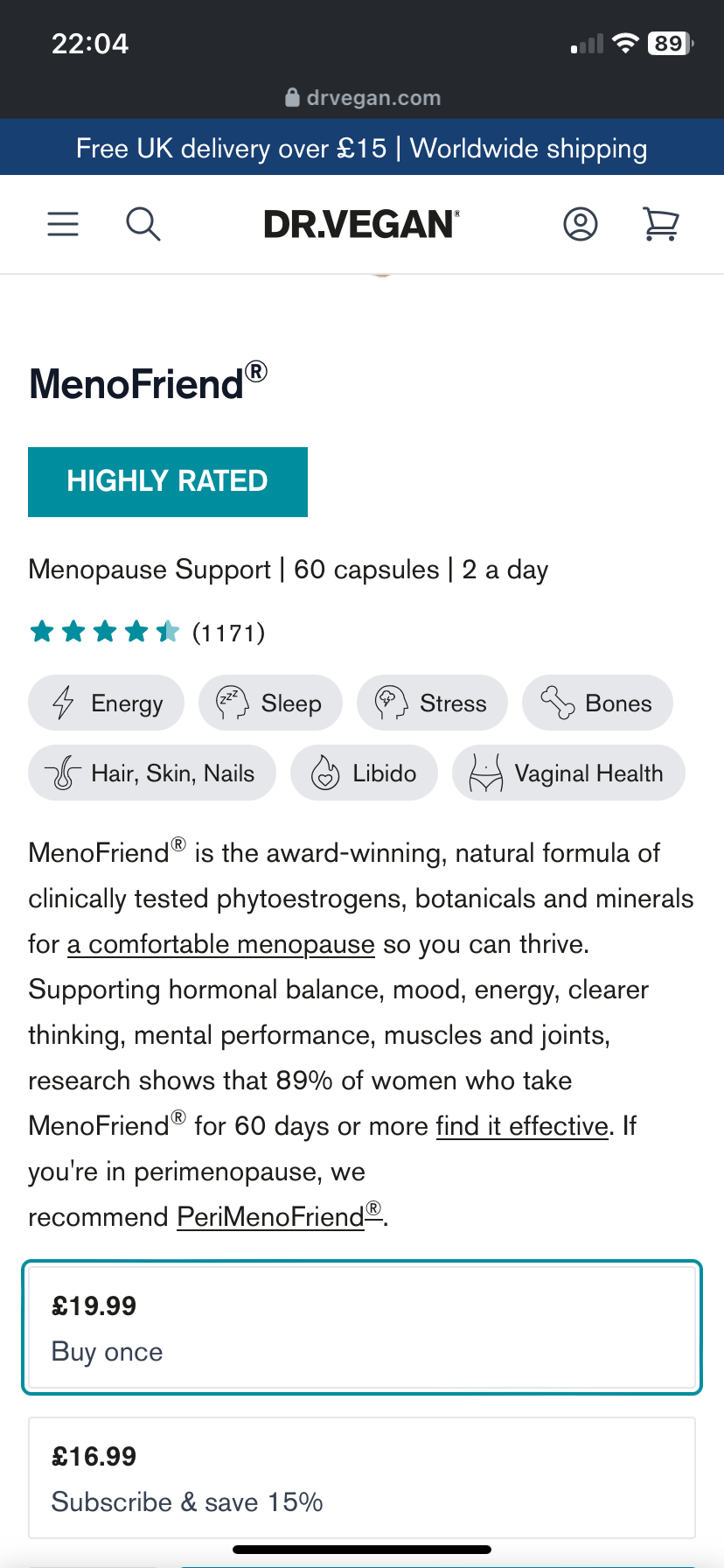
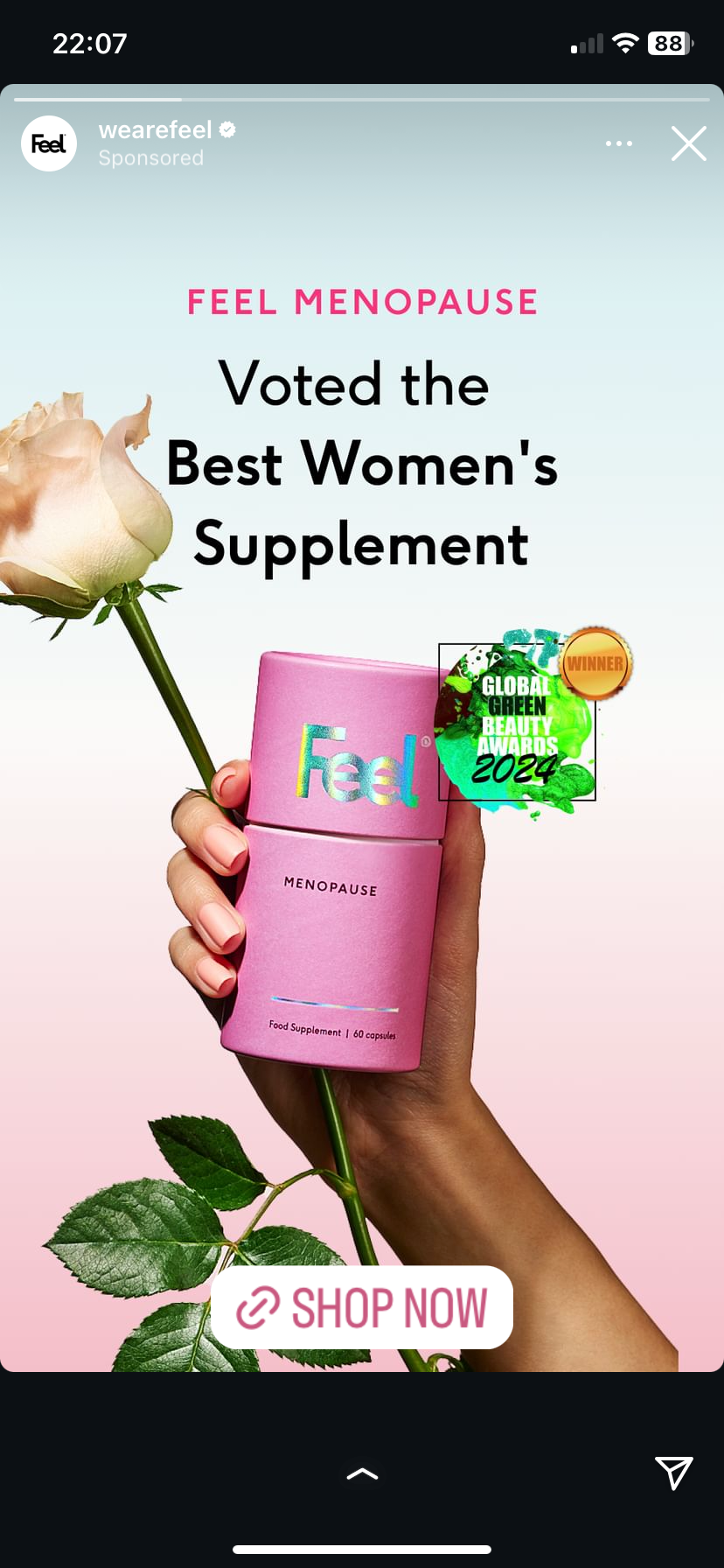
Instagram advertisements July- October 2024
I would argue that women of any age are getting advertisements to either look more youthful (botox, fillers, lifts, needling, supplements, serums, make-up tips), or beautiful (better skin, hair, nails, features, more sculpted), or both, and/or to be thin; or all three. If you are already all those three things - as understood by algorithms - then what kinds of products are you getting advertisements for? Bras? Period underwear? Confidence? Financial investing? Motherhood-related? Products to make your house smell nice? I would love to know.
Studying the advertisements are a way to identify the concepts, ideologies and values underlying these products as cultural, pharmaco-technological, and commercial products. This documentation thus tracks how the condition of menopause exists within the conceptual spaces of data-fied, algorithm-icised (yes, I made this up) marketing apparatuses associated with this platform.
The miracle cure
Redolent of get-rich-quick schemes, snake oil, and miracle cures, advertisements for online workout apps, supplements, and serums vow to help you succeed at everything from losing weight to looking young. The miracle workout regimen is particularly widespread across my Instagram feed and involves monthly subscriptions to 'All it takes is just this short 9 minute miracle workout that only this app can give you.' 'No other exercise regimen can ever deal with that pesky hormonal belly fat' . Your chronological age can be reset, or hidden. Other regimens, like 10,000 steps, don’t work as you need and expect. There is no secret miracle cure that no one else knows about. And if they did, they certainly would not be selling it on Instagram for £12.99 a month.
I'm particularly struck by the 'revenge body', and the [probably] AI-generated image of uber-sculpted older women that are intended to lure women to buy and buy into these fitness apps. Advertisements for the extremely strange and made-up 'Wall Pilates' also feature synthetic images of impossibly sculpted women. At the same time, I also see advertisements from local gyms actively reaching out to older women to train, get fit, lift weights, and lose weight. Here there is no miracle cure, but the promise of guidance to achieve your desired weight and fitness goals. Here, actual humans take it upon themselves to get you there; you do not have to walk x miles a day or do Wall Pilates.
Balance as corrective
Menopause can be a significantly destabilising time, hence 'balance' is a soothing notion. Who doesn't want 'balance' in their system, in the planetary system, in the political order? (If this was a different blog, I would go down the rabbit hole of the relationship between systems thinking and balance as co-productive philosophical ideas.) However, it is not possible to balance your hormones with a supplement, and an oral one at that. (More on this below). I follow the work of Dr Janet Gunter who not only demystifies the science of menopause (an informative starter video about 13 minutes long) but also takes peddlers-of-snake oil to task, from fellow physicians to celebrity influencers, and translates published academic and peer-reviewed studies about hormone therapy on her blog. I appreciate how Gunter, a medical practitioner who also works as a science communicator, translates the latest in medical research to her audiences. According to Gunter there is no such thing as 'hormone balancing' the way we might think of scales, equations, or spirit levels being balanced.
The study of hormones is a vast, complex, and subtle field that I don't believe can be readily translated without a good working knowledge of a range of physiological and biochemical processes in the human body. And I am not an endocrinologist nor profess to offer any advice on hormones. What I aim to do it is to bring alertness to the values and 'frames' around our thinking towards both cautious acceptance and healthy skepticism in our adoption of pharmaco-therapies for managing menopause. A wide range of conditions are the result of hormonal imbalance: diabetes is the most common one; thyroid disease, polycystic ovarian syndrome (PCOS), obesity, and infertility are others. 'Balancing' hormones in menopause is not necessarily a condition to be treated like these others: it is actually a normal physiological state. The challenge (of being human in any age perhaps) is not how to achieve balance but how to live with instability.
[[Or, for that matter, how to live with 'crepe-y chest skin' (see the advertisement above) I can't help but notice the obsessive focus on SPF for protection from sun damage, the cause of wrinkles. I do think this affects people with lighter skin more, but that said, in the past decade I have heard this in India too of late. But we are a nation overly-focused on skin lightness anyway, so this is no surprise.]]
Science to leverage Nature
I am promised that natural cocktails of beeswax and honey will work better than cheap brands and maintain my skin. The supplements featured in the advertisements on Instagram are said to contain natural extracts to restore balance, and manage entropy. It is impossible to know how and if they actually work. The women who appear in the advertisements: who are they, are they paid influencers, how long have they been on these supplements, and how might other consumers evaluate their claims to efficacy?
'Powered by nature. Backed by science.' The relationship between science and nature is one of the most significant ideas organising our contemporary Enlightenment-influenced societies in many parts of the world shaped by European and Anglocentric modernity. The separation of human from the natural and other-than-human (Divine, Irrational, Animal) through rational thinking, logic, reasoning, is the vulgar end of the idea I am focusing on here. In other words, higher forms of 'intelligence' come from cognition, upwards-from-the-shoulders perception, which includes the five sense organs. What happens unseen within the body, and below the neck, are processes we might consider more animal, or emotional. ChatGPT o1 gave me a fine list: butterflies in the stomach; goosebumps; ants in the pants; pig out; chicken out; cat got your tongue; fish out of water; dog tired; bull-headed/pig headed; elephant in the room; rat race; lionhearted; crocodile tears; wild goose chase. It is almost as if we have to invoke something from nature to convey a range of awkward or difficult social situations, human affects, and feelings.
Nature is cast as a pure former state that we are separate from. Nature has its secrets. Nature is powerful. Science has become that suite of conceptual and practical tools through which Nature's secrets might be extracted and captured. 'Powered by nature, backed by science' offers a happy medium through which to achieve control over this pesky, difficult, natural state of the female body - menopause. There's a soft glow (culturally, rhetorically) to menstruation because it signals fecundity and potential; menopause is well-established in terms of its manifestation but is nevertheless entropic: messy, unstable, chaotic, irreversible.
The message of menopause advertising is that there is a "better you" out there if only you would buy one of these apps, serums, or supplements. Arriving at menopause can be pretty debilitating for many women, so I can understand the vulnerabilities that these advertisements target. The only defense against their largely misleading claims can only be more and diverse information about this time in our lives, and support to make weather it.
